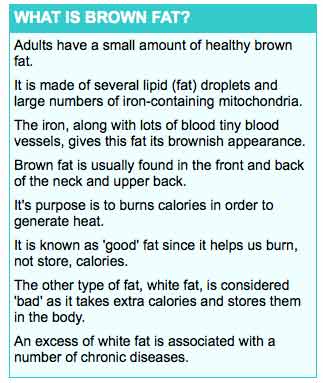 Scientists in Germany have developed an innovative new weight loss drug that appears to accelerate the body’s fat burning abilities.
Scientists in Germany have developed an innovative new weight loss drug that appears to accelerate the body’s fat burning abilities.
So far the only tests conducted have been on animals, but if future clinical trials prove it is save for human use the drug may have the potential to radically improve the weight loss process.
The drug is the result of research carried out at the University of Bonn, where the scientists discovered a specific enzyme (soluble guanylate cyclase, or sGC) has the ability to encourage a conversion process that that changes (unhealthy) white fat into (healthier) brown fat.
The new drug appears to be capable of stimulating the release of extra sGC.
Giving his expert opinion about the new drug, Professor Tom Sanders (King’s College, London) said: “This is a potentially important study as it suggests a mechanism that can set ‘fat on fire’.”
However, Sanders was quick to point out the fact that the drug has performed well for mice does not guarantee it will produce similar results for humans.
“It also remains to be seen whether the drug has any adverse effects on blood pressure, as this has been a problem with some other candidate drugs,” Sanders added.
[info]Responding to the comments, Alexander Pfeifer (head of the research team at Bonn University) admitted development of the treatment is still at an early stage, and the drug is yet to be tested on humans. But Pfeifer is confident the drug will have a “favourable safety profile” because it is chemically similar to riociguat—a drug that has recently been approved for the treatment of certain types of pulmonary hypertension.[/info]
White Fat v Brown Fat
 Many people may be surprised to learn not all body fat is created equal. There are two types—white and brown. Around 90% of the fat in an average adult’s body is the white kind, a fact that is unfortunate because white body fat is the more dangerous of the two. The other 10% of human body fat is the brown kind.
Many people may be surprised to learn not all body fat is created equal. There are two types—white and brown. Around 90% of the fat in an average adult’s body is the white kind, a fact that is unfortunate because white body fat is the more dangerous of the two. The other 10% of human body fat is the brown kind.
White body fat acts a little like a magnet for calories. It soaks them up and uses them to sculpt blubber bellies and love handles, dramatically raising the risk of heart disease and type 2 diabetes in the process.
Brown body fat (adipose tissue) behaves quite differently. It helps to burn calories.
Brown fat is not usually located around the belly area, but rather around the neck and upper back. It contains numerous tiny blood vessels that white fat does not and it is the presence of these blood vessels that provide brown fat with its darker colour.
During infancy, the human body has a slightly higher percentage of brown fat, but the amount diminishes with age. However some studies show that adults who have managed to retain more brown fat than is normal are usually slimmer than those who are less fortunate.
The results of early studies, published in the journal Nature Communications, showed mice that had been treated with the new drug released higher than normal amounts of sGC, and more brown fat was formed as a result.
Concluding Thoughts
The availability of so much cheap food in such a variety of flavours, and so many fast food and snack options, has resulted in a continued increase in obesity. It is a problem that now exists on a worldwide scale and the treatment and management of obese patients and people who are suffering from weight-related health issues is a great burden for health authorities all over the world.
Although it is clear further study is required before the drug can be made available to the general public, the research to date is highly promising. If future data does support the use of the drug as a safe weight management option, it could be one of the greatest discoveries of the century.
What are the most popular and best selling diet pills – click here

Be the first to comment